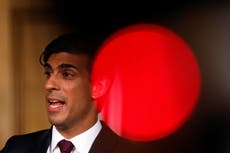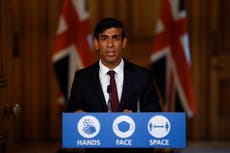The Independent's journalism is supported by our readers. When you purchase through links on our site, we may earn commission.
Rishi Sunak has taken a stand against public opinion on opening up the economy
The chancellor took a surprisingly blunt line about the need to prioritise saving jobs as much as saving lives in his winter statement

Your support helps us to tell the story
From reproductive rights to climate change to Big Tech, The Independent is on the ground when the story is developing. Whether it's investigating the financials of Elon Musk's pro-Trump PAC or producing our latest documentary, 'The A Word', which shines a light on the American women fighting for reproductive rights, we know how important it is to parse out the facts from the messaging.
At such a critical moment in US history, we need reporters on the ground. Your donation allows us to keep sending journalists to speak to both sides of the story.
The Independent is trusted by Americans across the entire political spectrum. And unlike many other quality news outlets, we choose not to lock Americans out of our reporting and analysis with paywalls. We believe quality journalism should be available to everyone, paid for by those who can afford it.
Your support makes all the difference.When a politician takes a stand against public opinion it is time to sit up and pay attention. Especially when it is Rishi Sunak, the most popular politician in Britain and the most likely next prime minister – according to the betting market, he overtook Keir Starmer this week as the favourite to succeed Boris Johnson.
The chancellor’s statement in parliament on Thursday was short, making only four significant announcements. There will be a subsidy for employers who keep workers on part-time; similar help for the self-employed; companies will be given longer to repay government loans; and the VAT cut for hospitality and tourism will be extended.
What was striking, though, was the force with which Sunak argued that minimising the death toll from coronavirus should not take priority over all else. He said the government had eased restrictions since May “because life means more than simply existing”, an unusually philosophical turn of phrase for someone who had just been talking about spreading VAT bills over 11 smaller repayments.
It is quite hard for a politician to say that some people will die because it is more important for others to “find meaning and hope through our friends and family, and through our work and community”. But he came as close as he decently could and what is more, he repeated it.
He said the price our country is paying for the virus is “wider” than “lives lost”. There are “awful trade-offs between health, education and employment” and “we must bear all those costs in mind”. In other words, the cost in missed education and lost jobs must count as well as that in lives. Just in case we hadn’t got the message, he ended with the ringing declaration that we must learn to “live without fear”.
Public opinion leans the other way. According to an Ipsos MORI survey last weekend, 45 per cent of people say the government should “prioritise people’s health” rather than “the economic health of the country”; 33 per cent say we should consider “both equally”; while only 11 per cent want to prioritise the economy.
So what is Sunak up to? Presumably, he is expressing his sincere view, but for someone in his position there are layers upon layers of calculation too. He has been at one end of a cabinet discussion, with Matt Hancock, the health secretary, at the other end. Sunak has led the “liberators”, while Hancock has led the “suppressors”. The prime minister’s position is ambiguous. He said he was “spiritually reluctant” to take the new measures he announced on Tuesday, yet the tone of the address was doom-laden: “Your mild cough can be someone else’s death knell.”
On the other hand, the “impositions” themselves, as Johnson called them, are minor: 10pm closing time for pubs and restaurants, table service only, a bit more face-covering, and a shift in emphasis back to working from home. Could it be that Johnson is trying to appear to be taking stricter measures than he is, to reassure a worried public, while sending out his most popular minister to make the difficult case for a more Swedish approach?
Some prime ministers, such as Margaret Thatcher and Tony Blair, tried to lead public opinion, but Johnson is more of a follower. Perhaps this is not so much a failing, but a recognition of his limitations. He knows how badly it would be received if he appeared to be dismissive of coronavirus deaths. Meanwhile, his chancellor can gain a hearing for saying that the fear of the virus has been overdone.
So it may be that there is less distance between Johnson and Sunak than was suggested by the prime minister’s absence from the Commons when the chancellor made his statement. All the same, Sunak has his own interests to consider. He has been assiduous in inviting Conservative MPs to 11 Downing Street, or canvassing them on the phone, to ask them how he can help businesses in their constituencies. He will know, therefore, what their mood is.
On the big question of the moment – do the current restrictions go too far or not far enough – we can guess what the answer is from the public position of Sir Graham Brady, the chair of the 1922 Committee of Tory backbenchers. He wants parliament to approve future changes in the rules before they are made, rather than afterwards. This is partly out of democratic principle, which is why Labour MPs support his attempt to amend the Coronavirus Act, but partly because he thinks the current rules are an infringement of people’s liberties. Unlike the general public, the parliamentary Conservative party leans towards opening up the economy. And Tory MPs have the vote in the first stage of a Tory leadership contest.
It could be pointed out that we are probably at least three years away from such a contest. But Gordon Brown campaigned ceaselessly for his neighbour’s job for the 10 years he was chancellor, and he was successful in the end. Sunak is well aware that he faces an obstacle to his ambition in the shape of rising unemployment – something Brown did not experience until he was prime minister.
All the more reason, therefore, for Sunak to argue that the economy is not some abstract entity, but people’s jobs, livelihoods and their “meaning and hope”. If he can persuade the British people of his case, he will be unstoppable as Johnson’s successor.




Join our commenting forum
Join thought-provoking conversations, follow other Independent readers and see their replies
Comments